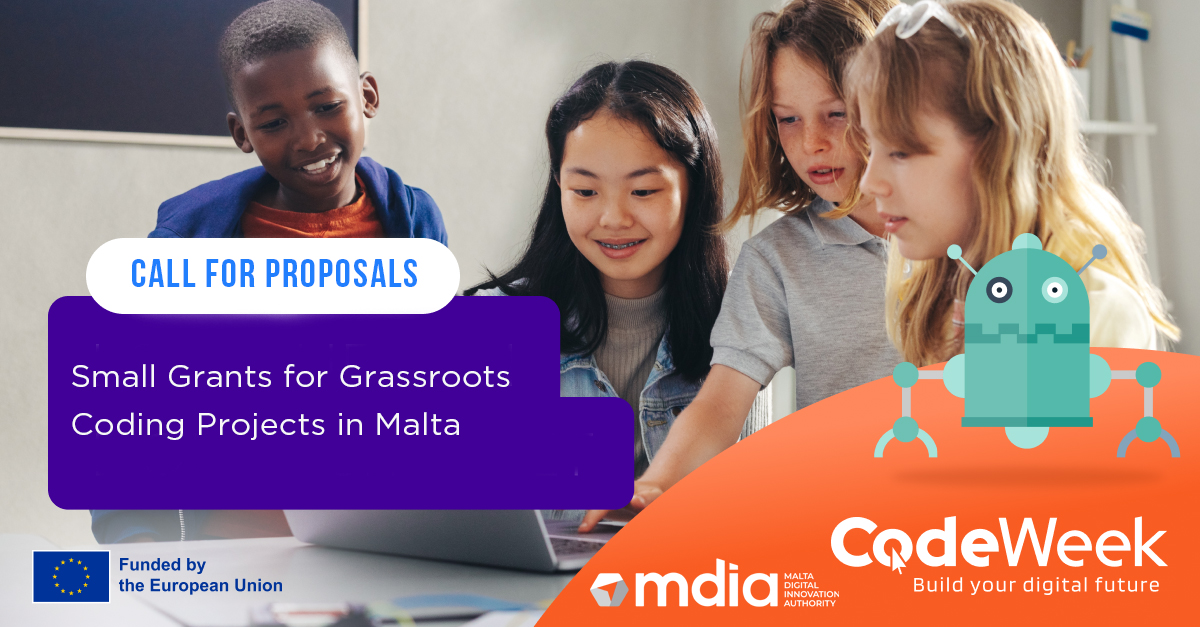CALL FOR PROPOSALS – Small Grants for Grassroots Coding Projects in Malta as part of EU Code Week
31/05/25
The EU Code Week Grants for Grassroots programme is a new initiative designed to foster digital innovation and coding education throughout Europe For more information read our recent blog post, EU Code Week Grants for Grassroots: Supporting Digital Innovation Across Europe. Please find below a call for proposals from our partners Malta Digital Innovation Authority (MDIA), which is open to the Code Week community in Malta.
________________________

CALL FOR PROPOSALS – Small Grants for Grassroots Coding Projects in Malta as part of EU Code Week
Are you ready to bring your innovative coding project to life or scale your existing initiatives?
Code4Europe Consortium is setting up a grant system to foster grassroots projects, proposing activities that significantly merge the priorities of Code Week. Malta Digital Innovation Authority (MDIA) invites applications for small grants to support impactful flagship activities in digital education, coding and computational thinking to boost Digital Skills for young people.
Purpose and Scope
The purpose of this Call for Grants is to identify and support impactful grassroots coding projects aligned with EU Code Week’s mission to promote coding, computational thinking, and digital skills for young people across Europe.
Key objectives include:
• Enabling the development of innovative and scalable coding activities.
• Supporting initiatives that integrate coding into educational contexts and foster engagement.
• Encouraging community involvement and fostering collaboration among stakeholders.
• Prioritising projects that bridge the gender gap and promote diversity in STEM education.
Grant Details
Grants will be given to the top 3 successful applicants, with €2500 for first place, €1500 for second place, and €1000 for third place. The selection will be based on the quality and impact of the proposals. Proposals will be assessed based on criteria such as clarity, feasibility, educational impact, and alignment with EU Code Week’s objectives. Submissions should clearly indicate how the requested funds will be used, with proposed activities directly linked to the amount that may be awarded. All planned actions must be proportionate to the potential prize and will only be expected to proceed if funding is granted.
This call (as well as the financial support that will be provided through it) is NOT an EU action. This call is launched solely by Malta Digital Innovation Authority (MDIA). The financial support to the selected successful applicants will be provided directly by Malta Digital Innovation Authority in its own name and under its own responsibility. MDIA’s responsibility includes the preparation and drafting of this call as well as the selection of successful applicants who will receive the said financial support. The publication of this call on the EU Funding & Tenders Portal is made solely for information purposes, with the aim of increasing the visibility of this call to the general public, including potential applicants (i.e. students). The said publication shall not be construed as direct or indirect approval of the content and conditions of this call by the relevant EU authorities or as any form of waiver from the above-described responsibility of MDIA.
Eligibility
Eligible applicants include:
- Schools (pre-primary, primary, secondary, and high schools),
• Libraries and similar institutional entities,
• Non-Governmental Organisations (NGOs),
• Private organisations and coding clubs,
• Associations specialised in coding and computational thinking.
If the applicant is an organisation: proceed to upload the Declaration of the legal representative. A declaration signed by the legal representative must be uploaded for each proposal, certifying the application for participation in the selection and compliance with the requirements indicated.
Application Process
Interested organisations are invited to submit a project proposal by 7th July 2025. Applications must be submitted through https://forms.gle/J7cYTjGt4MjJrjH79
As part of this grant call, funding is provided through EU Cascading Funding, meaning the EU allocates funds to the Code4Europe Consortium which then distributes this grant to selected applicants via open calls; successful applicants will be required to provide supporting documentation to claim their awarded funds. A template agreement will be provided to formalise the grant arrangement with the selected winners. The selection process will be transparent and objective, with measures in place to avoid any conflicts of interest.
Each applicant needs to present:
• A description of the project, its objectives, and expected impact.
• Details on the implementation plan, timeline, and resources required.
• Information about the applicant organisation, including relevant experience.
Each applicant also needs to upload:
• a proposed budget for the project with their submission. Budget template can be downloaded here.
• and additional supporting documents e.g., project plans, previous projects, endorsements.
• provide links to any online resources (if applicable).
Evaluation and Selection
A selection committee comprising community stakeholders and representatives from the Regional/National Hub will evaluate proposals.
Evaluation Criteria Details
Proposals will be assessed based on:
• Presentation, which assesses the project through the categories of clarity and completeness.
• Design congruity, which assesses the significance of the objectives in relation to Code Week’s priorities and whether the activities design is consistent with these objectives and appropriate for their achievement. Additionally, the feasibility of activities is assessed by taking into consideration: the activities timeline as well as the professional, organisational and technological resources available.
• Education in coding and computational thinking, which assesses the centrality of coding and computational thinking through the proposed use of coding approaches (block languages, unplugged coding, etc), languages, and mediators.
• Quality of the proposal which is assessed by considering didactic elements, such as methodological choices; the proposal connection with core disciplines (literacy, numeracy, data and digital literacy – OECD Learning Compass; CoE Keis competencies for LLL 2018). Secondly, those elements are also taken into consideration: the use of assessment tools; the development of synergies in territorial contexts and collaborative networks to improve the efficacy of the initiative and involve the various stakeholders. Finally, the following features are appreciated: a broader timeframe extending before and beyond the temporal dimension of the single ‘week’; the sharing of resources and materials to foster the replicability of activities.
• Impact, is assessed by considering: the involvement of multiple classes, schools, different participants categories and the local context. Specific attention to the involvement of girls and fostering STEM education are also assessed.
Where possible, priority will be given to projects involving upper secondary schools and engagement of ‘leading teachers’ in the project.
Timeline
• Call for Proposals Release: 5th May 2025
• Application Deadline: 7th July 2025
• Notification of Awardees: 28th July 2025
• Project Implementation Period: Completed by October 2025
Contact Information
For inquiries, please contact digitalskills.mdia@gov.mt


